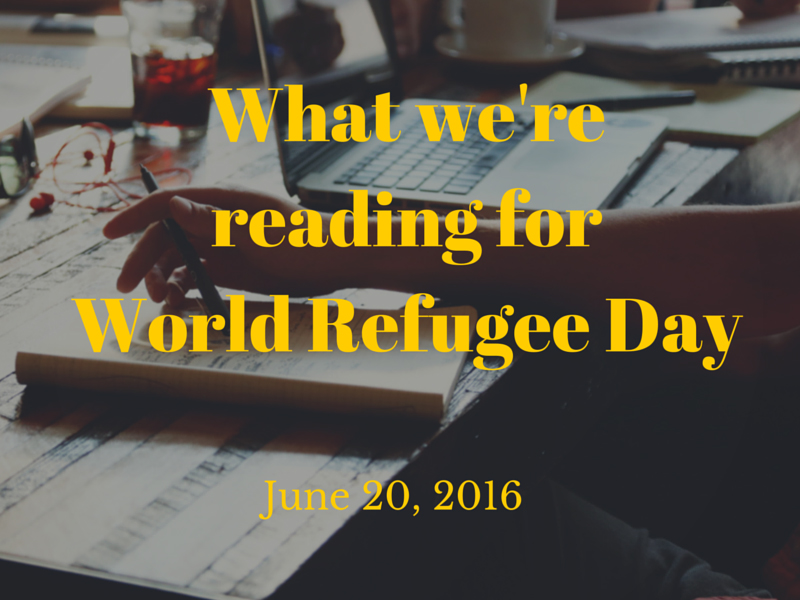Six Books to Make Your World Refugee Day More Meaningful
By Rachel Nusbaum, HIAS.org
Jun 06, 2016

Established 15 years ago by the United Nations, World Refugee Day honors the courage, strength and determination of those who are forced to flee persecution, conflict and violence.
The scale of the crisis is huge—millions of people have been displaced from their homes. It can all seem overwhelming, even incomprehensible.
But sometimes all it takes is a single story to remind us that, at the end of the day, it isn’t so terribly complicated. Refugees are ordinary people in extraordinary situations, and it takes only a little imagination to walk in their shoes.
So we asked the refugee experts at HIAS, the oldest refugee protection organization in the world, to tell us which books moved them, inspired them and changed the way they thought about refugee issues.
Read one, or read them all. Let us know if we missed your favorite: @HIASrefugees
Brother, I'm Dying
By Edwidge Danticat
[[{"fid":"1801","view_mode":"default","fields":{"format":"default","field_file_image_alt_text[und][0][value]":"Brother, I'm Dying By Edwidge Danticat","field_file_image_title_text[und][0][value]":""},"type":"media","attributes":{"alt":"Brother, I'm Dying By Edwidge Danticat","style":"line-height: 20.8px; height: 308px; width: 200px; margin: 5px 10px; float: right;","class":"media-element file-default"}}]]
When Hitler Stole Pink Rabbit
By Judith Kerr
The Road from Home
By David Khordian
What is the What
By Dave Eggers
[[{"fid":"1805","view_mode":"default","fields":{"format":"default","field_file_image_alt_text[und][0][value]":"","field_file_image_title_text[und][0][value]":""},"type":"media","attributes":{"style":"line-height: 20.8px; margin: 5px 10px; float: right;","class":"media-element file-default"}}]]What Is the What tells the story of a refugee from the second Sudanese civil war (1983–2005), one of the 20,000 so-called Lost Boys who walked thousands of miles from their decimated villages to relative safety in Ethiopia and later Kenya. From there the surviving boys’ fates diverged greatly and the novel’s protagonist ultimately makes his way to America.
Told by Valentino Achak Deng, one of 4,000 refugees offered sanctuary in the U.S. in 2001, the story moves from a harrowing account to a reflection on assimilation and identity, loneliness and newfound community.
Deng’s adolescent voice is both poignant and heartbreaking as he recalls his pre-war village life, his devastating journey, his refugee-camp adolescence, and his early experiences in Atlanta. “It’s at once a page-turner journey tale and a deep-dive into being a new American with a past that has become irrelevant but is impossible to break free from,” says Zhanna Veyts, director of digital strategy & engagement.
A Backpack, a Bear and Eight Crates of Vodka
By Lev Golinkin
[[{"fid":"1807","view_mode":"default","fields":{"format":"default","field_file_image_alt_text[und][0][value]":"","field_file_image_title_text[und][0][value]":""},"type":"media","attributes":{"style":"height: 300px; width: 196px; margin: 5px 10px; float: right;","class":"media-element file-default"}}]]
Lev Golinkin tells the story of his family’s flight from the Soviet Union in what The New York Times called a "hilarious and heartbreaking story of a Jewish family’s escape from oppression." Through the eyes of his younger self, Golinkin paints a heartfelt and compelling picture not only of the life they left behind but of the challenges of everyday life in Indiana for the family of newly arrived refugees.
“Eight-year-old Golinkin’s deeply moving description of being taunted and beaten at school in his hometown in Ukraine—for no reason other than that he was a Jew—helped me to better understand the suffering so many endured in the Soviet Union,” said Bill Swersey, senior director of communications and digital media at HIAS. “The chapters on his family’s comic, bizarre, courageous escape to the West are as gripping as any action movie. 25 years after the fall of the Soviet Union, this book serves is an important reminder and tribute.”
Half of a Yellow Sun
By Chimamanda Ngozi Adichie
[[{"fid":"1806","view_mode":"default","fields":{"format":"default","field_file_image_alt_text[und][0][value]":"","field_file_image_title_text[und][0][value]":""},"type":"media","attributes":{"style":"height: 308px; width: 200px; margin: 5px 10px; float: right;","class":"media-element file-default"}}]]
“When the Igbo people of eastern Nigeria seceded in 1967 to form the independent nation of Biafra, a bloody, crippling three-year civil war followed. [Half of a Yellow Sun] is a transcendent novel of many descriptive triumphs, most notably its depiction of the impact of war's brutalities on peasants and intellectuals alike. It's a searing history lesson in fictional form, intensely evocative and immensely absorbing,” wrote Publishers Weekly.
Half of a Yellow Sun follows two sisters, Olanna and Kainene, and uses their voices to paint a stark and uncompromising picture of civil war and its victims.
“Adichie’s characters are so real and so alive, they carry with them the type of deep truth that sometimes it is easier to tell in fiction. She reveals, in devastating detail, how far removed the war’s victims were from its causes,” said Bethany Orlikowski, a program officer for HIAS’ global programs. “While this is a fictional account, the stories told in this book are all too real for millions of refugees and displaced people across the globe.”

